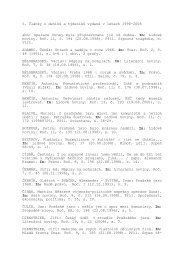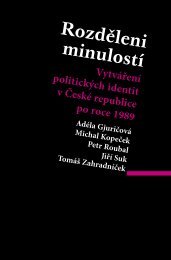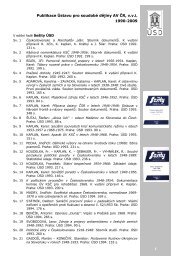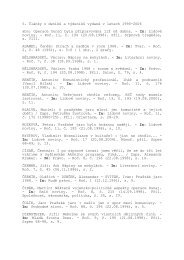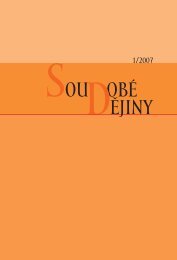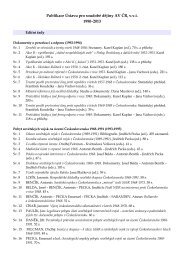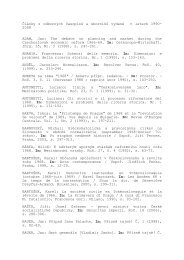SOU OBà ÄJINY - Ãstav pro soudobé dÄjiny AV - Akademie vÄd ÄR
SOU OBà ÄJINY - Ãstav pro soudobé dÄjiny AV - Akademie vÄd ÄR
SOU OBà ÄJINY - Ãstav pro soudobé dÄjiny AV - Akademie vÄd ÄR
Create successful ePaper yourself
Turn your PDF publications into a flip-book with our unique Google optimized e-Paper software.
Summaries Anotace 521<br />
political movement, and they eventually became the catalyst of the <strong>pro</strong>nounced<br />
division within the Civic Forum. But these calls never turned into a decisive political<br />
strategy and they managed to hold a dominant place only in the <strong>pro</strong>grammes of the<br />
less important parties and organizations like the Club of Engage Non-Party Members<br />
(Klub angažovaných nestraníků – KAN) and the Confederation of Political Prisoners<br />
(Konfederace politických vězňů). After the break-up of Civic Forum in late 1990 and<br />
early 1991, radical anti-Communism ran out steam, and the right-of-centre political<br />
parties that emerged from the erstwhile Civic Forum – primarily the Civic Democratic<br />
Party, the Civic Democratic Alliance, and the Christian Democratic Party – adapted<br />
the originally radical demands to a realistic policy of com<strong>pro</strong>mise based on the fact<br />
that the Communist Party of Bohemia and Moravia, with the support of more than<br />
ten per cent of the electorate, remained a part of the democratic political system. The<br />
largely ignored sense of frustration with morals, stemming from the fundamental<br />
contradiction between the ideal (that is, comprehensive) possibilities of a policy of<br />
settling scores and the real (that is, limited) possibilities, was put off for later years,<br />
and remains a public <strong>pro</strong>blem to this day.<br />
A Rather Traditional Break with the Past: The Presence of the Past<br />
in the Ideology and Political Rhetoric of the Civic Democratic Party<br />
Adéla Gjuričová<br />
The Civic Democratic Party (Občanská demokratická strana) was founded in early<br />
1991 with no historical predecessor. According to its founders it was founded ‘in spite<br />
of’ the tradition of Czech political thought, with reference only to Anglo-American<br />
political models. This article investigates whether these historical factors were truly<br />
absent, and, among other things, points to the veiled use of widely shared historical<br />
stereotypes in the popularization of the chosen variant of economic transformation.<br />
From the political crises of 1997 and 1998, when the right-of-centre governing<br />
coalition fell apart and the Social Democrats took power, Civic Democratic Party<br />
rhetoric linked up far more explicitly with Czech tradition and history. This trend<br />
came to a peak between 2000 and 2002, when the party no longer saw Czech<br />
national traditions and interests as being in conflict with the allegedly <strong>pro</strong>vincial<br />
thinking of the Czechs’ post-Communist neighbours, but rather in conflict with the<br />
structure and orientation of the European Union and the interests of Germany.<br />
In the second part of the article the author discusses how in the Civic Democratic<br />
Party the interpretation of ‘coming to terms with the Communist past’ was changed.<br />
She supports the view that this was not merely a matter of a short-term political<br />
instrumentalization of changes in mood in society or reactions to pressures from<br />
regional organizations and political opponents. Rather, she argues, it was a matter<br />
of a relatively consistent conception of the Communist past as an alien element in<br />
Czech history, which needed, as part of the idea of ‘breaking with the past’, to be<br />
driven out of its own tradition. This sort of conception leaves no room, however, for



